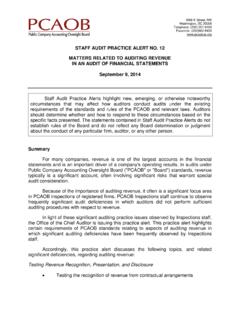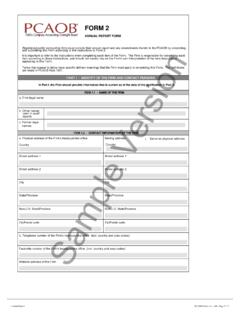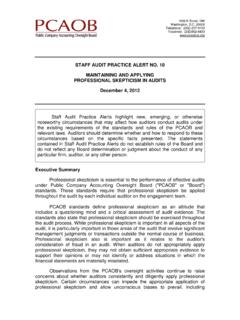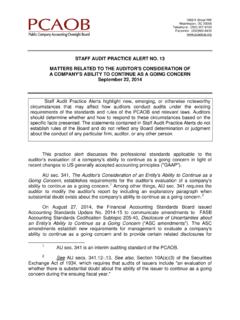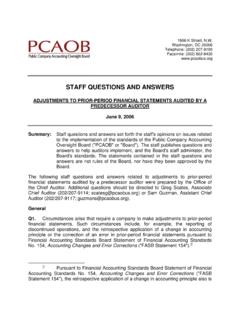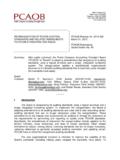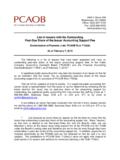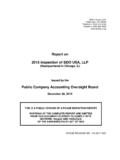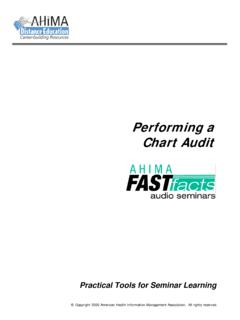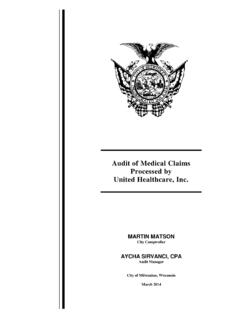Transcription of 1666 K Street, NW www.pcaobus
1 1666 K Street, NW Washington, 20006 Telephone: (202) 207-9100 Facsimile: (202) 862-8430 THE AUDITOR'S REPORT ON AN audit OF FINANCIAL STATEMENTS WHEN THE AUDITOR EXPRESSES AN UNQUALIFIED OPINION AND RELATED AMENDMENTS TO PCAOB standards ) ) ) ) ) ) ) ) ) ) PCAOB Release No. 2017-001 June 1, 2017 PCAOB Rulemaking Docket Matter No. 034 Summary: The Public Company Accounting Oversight Board ("PCAOB" or "Board") is adopting a new standard, The Auditor's Report on an audit of Financial Statements When the Auditor Expresses an Unqualified Opinion, that will replace portions of AS 3101, Reports on Audited Financial Statements. The remaining portions of AS 3101 will be redesignated as AS 3105, Departures from Unqualified Opinions and Other Reporting Circumstances.
2 The Board is also adopting related amendments to PCAOB standards . Board Contacts: Martin F. Baumann, Chief Auditor (202/207-9192, Jennifer Rand, Deputy Chief Auditor (202/207-9206, Jessica Watts, Associate Chief Auditor (202/207-9376, Karen Wiedemann, Associate Counsel (202/591-4411, Elena Bozhkova, Assistant Chief Auditor (202/207-9298, Ekaterina Dizna, Assistant Chief Auditor (202/591-4125, and Andres Vinelli, Chief Economist (202/207-9291, ** PCAOB Release No. 2017-001 June 1, 2017 Page i Contents I. Summary .. 1 II. Background .. 4 A. Rulemaking History .. 4 B. Initiatives of Other Regulators and Standard Setters .. 7 III. Overview of the Final Standard .. 11 IV. Discussion of the Final Standard .. 15 A. Critical audit Matters .. 15 B. Additional Improvements to the Auditor's 44 C.)))))))
3 Explanatory Language and Emphasis of a Matter .. 55 D. Information about Certain audit Participants .. 58 E. form of the Auditor's 59 F. Application to Other Audits Performed Under PCAOB standards .. 60 V. Amendments to Other PCAOB standards .. 61 A. AS 3105, Departures from Unqualified Opinions and Other Reporting Circumstances .. 61 B. Other Amendments to PCAOB standards .. 63 VI. Economic Considerations .. 64 A. Need for the Rulemaking .. 65 B. Baseline .. 72 C. Benefits .. 75 D. Costs and Potential Unintended Consequences .. 86 E. Alternatives Considered, Including Policy Choices under the Final Standard .. 96 VII. Applicability of Critical audit Matter Requirements .. 101 A. Brokers and Dealers, Investment Companies, and Benefit Plans .. 101 B. Smaller Companies .. 108 VIII. Considerations for Audits of Emerging Growth Companies .. 109 A. Critical audit Matters.
4 110 B. Additional Improvements to the Auditor's 112 IX. Effective Date .. 113 Appendix 1: AS 3101, The Auditor's Report on an audit of Financial Statements When the Auditor Expresses an Unqualified Opinion .. A1-1 Appendix 2: Amendments to Other PCAOB standards .. A2-1 PCAOB Release No. 2017-001 June 1, 2017 Page 1 I. Summary The Board is adopting a new auditor reporting standard, AS 3101, The Auditor's Report on an audit of Financial Statements When the Auditor Expresses an Unqualified Opinion (the "final standard" or "AS 3101") and related amendments to its auditing standards that will require the auditor to provide new information about the audit and make the auditor's report more informative and relevant to investors and other financial statement users. The final standard retains the pass/fail opinion of the existing auditor's report but makes significant changes to the existing auditor's report, including the following: Communication of critical audit matters matters communicated or required to be communicated to the audit committee and that: (1) relate to accounts or disclosures that are material to the financial statements; and (2) involved especially challenging, subjective, or complex auditor judgment; Disclosure of auditor tenure the year in which the auditor began serving consecutively as the company's auditor; and Other improvements to the auditor's report a number of other improvements to the auditor's report to clarify the auditor's role and responsibilities, and make the auditor's report easier to read.
5 The Board believes that adopting these requirements responds to the strong interest of investors for enhanced communication about the audit and is consistent with its mandate to "protect the interests of investors and further the public interest in the preparation of informative, accurate and independent audit reports."1 The Board is adopting the final standard after more than six years of outreach and public comment, including comments from members of the Board's Standing Advisory Group ("SAG") and Investor Advisory Group ("IAG"). The Board has taken into consideration all comments and believes its approach responds to investor requests for additional information about the financial statement audit without imposing requirements beyond the auditor's expertise or mandate. Investors are the beneficiaries of the audit and the auditor's report is the primary means by which the auditor communicates with them.
6 Currently, however, the auditor's report conveys little of the information obtained and evaluated by the auditor as part of 1 Section 101(a) of the Sarbanes-Oxley Act of 2002 ("Sarbanes-Oxley"), 15 7211(a). PCAOB Release No. 2017-001 June 1, 2017 Page 2 the audit . And while the auditor's report has generally remained unchanged since the 1940s, companies' operations have become more complex and global, and the financial reporting frameworks have evolved toward an increasing use of estimates, including fair value measurements. As part of the audit , auditors often perform procedures involving challenging, subjective, or complex judgments, but the auditor's report does not communicate this information to investors. Stated differently, the auditor's report does little to address the information asymmetry between investors and auditors,2 even though investors have consistently asked to hear more from the auditor, an independent third-party expert whose work is undertaken for their The Board believes that reducing the information asymmetry between investors and auditors should, in turn, reduce the information asymmetry between investors and management.
7 Outside the United States, other regulators and standard setters have already adopted expanded auditor reporting. The communication of critical audit matters will inform investors and other financial statement users of matters arising from the audit that involved especially challenging, subjective, or complex auditor judgment, and how the auditor addressed these matters. The Board believes that these matters will likely be identified in areas that investors have indicated would be of particular interest to them, such as significant management estimates and judgments made in preparing the financial statements; areas of high financial statement and audit risk; significant unusual transactions; and other significant changes in the financial statements. The final standard is designed to elicit more information about the audit directly from the auditor.
8 The Board believes that the critical audit matter requirements will respond to requests from investors for more information from the auditor while appropriately addressing concerns raised by other commenters. 2 Economists often describe this imbalance, where one party has more or better information than another party, as "information asymmetry." As part of the system of financial reporting, the audit of the financial statements helps reduce the information asymmetry investors face by providing an independent opinion about whether the financial statements are presented fairly in all material respects. 3 See PCAOB IAG survey, Improving the Auditor's Report (Mar. 16, 2011) ("IAG 2011 survey"). See also CFA Institute's Usefulness of the Independent Auditor's Report Survey Results (May 4, 2011), Independent Auditor's Report Survey Results (Mar.)
9 31, 2010), and Independent Auditor's Report Monthly Poll Results (Mar. 12, 2008) ("CFA survey and poll results"). See also Board public meeting transcripts and participant statements (Apr. 2-3, 2014), available on the Board's website in Rulemaking Docket Matter No. 034, Proposed Auditing standards on the Auditor's Report and the Auditor's Responsibilities Regarding Other Information and Related Amendments ("Docket 034"). PCAOB Release No. 2017-001 June 1, 2017 Page 3 Investors and investor advocates have suggested a variety of ways in which investors can use the information provided in critical audit matters. In the view of some investors, critical audit matters will add to the total mix of information, providing insights relevant in analyzing and pricing risks in capital valuation and allocation, and contributing to their ability to make investment decisions.
10 Investors also stated that critical audit matters will focus their attention on key financial reporting areas and identify areas that deserve more attention, enhancing the efficiency of investors and others in the consumption of financial information. Some investors believe that critical audit matters will highlight areas that they may wish to emphasize in their engagement with the company and provide important information that they can use in making proxy voting decisions, including ratification of the appointment of auditors. The final standard also includes a new required statement in the auditor's report disclosing the year in which the auditor began serving consecutively as the company's auditor, as well as a number of other improvements to the auditor's report, such as a statement regarding the requirement for the auditor to be independent.
